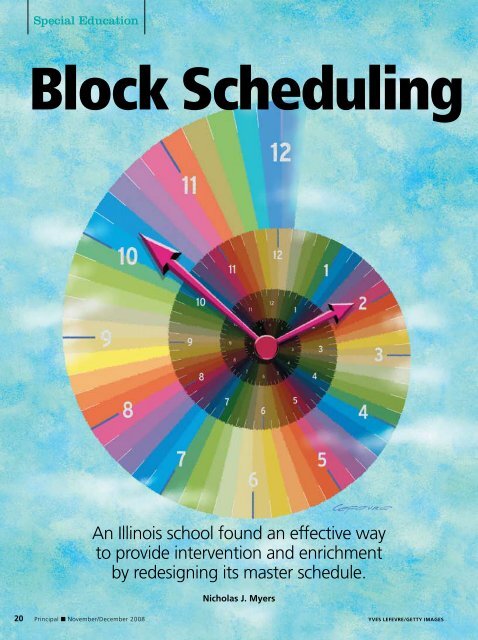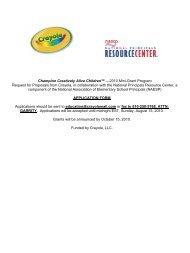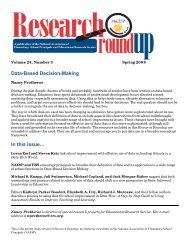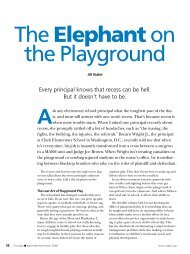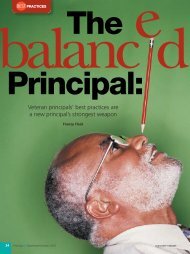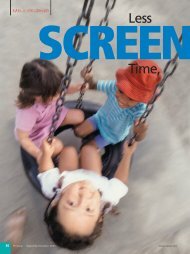Block Scheduling That Gets Results - National Association of ...
Block Scheduling That Gets Results - National Association of ...
Block Scheduling That Gets Results - National Association of ...
You also want an ePaper? Increase the reach of your titles
YUMPU automatically turns print PDFs into web optimized ePapers that Google loves.
Special Education<strong>Block</strong> <strong>Scheduling</strong>An Illinois school found an effective wayto provide intervention and enrichmentby redesigning its master schedule.Nicholas J. Myers20 Principal n November/December 2008Yves Lefevre/Getty Images
<strong>That</strong> <strong>Gets</strong> <strong>Results</strong>All children can learn. When principals and facultiestruly embrace this core belief and openly demonstrateit to students, parents, and each other, dramaticimprovements in academic performance can result. However,while it is certainly true that all children are capable <strong>of</strong> remarkableacademic success, it is also true that learning occursat different rates. This is demonstrated vividly with childrentraditionally considered as “at-risk.” But if we really believethat all children can learn, it is our responsibility to deviseinnovative systems to ensure that all children do learn. Oneplace where this is occurring is Anne Fox Elementary School.Fox School is a moderately lowincome,demographically diverse schoollocated in the working-class suburb <strong>of</strong>Hanover Park, Illinois. The student populationis 34 percent white, 30 percentHispanic, 17 percent black, and 19 percentAsian/Pacific Islander. More than35 different languages are representedand the school’s low-income and mobilityrates are double the district average.Until recently, Fox School ranked deadlast in academic achievement amongthe district’s 21 elementary schools. Butthe incorporation <strong>of</strong> new support systemshas produced dramatic increasesin overall student achievement in each<strong>of</strong> the past two school years.A Troubled SchoolThe road to improvement was notan easy one to navigate for a facultythat, until very recently, was experiencinggreat frustration over persistentlylow levels <strong>of</strong> student performance onlocal and state assessments. Over time,the school had come to be known asa district “problem spot.” Of greatestconcern was the absence <strong>of</strong> effectivesystems to truly intervene for studentsexhibiting difficulty mastering gradelevelconcepts and skills.“It is critical that weidentify every child byname and need if we are tobe successful in maximizinghis or her learningpotential.”Lacking authentic data from welldesignedformative assessments <strong>of</strong> studentachievement, teachers were largelyfending for themselves in the mannerin which they assessed student progressand determined grade-level pr<strong>of</strong>iciencyin targeted areas. Without rich data,there also was an absence <strong>of</strong> collaborativeplanning to develop interventionstrategies for students in need.The school relied on outdated andineffective modes <strong>of</strong> remediating studentsstruggling to grasp the essentialskills required <strong>of</strong> all students exitingfrom a given grade level. The threemain methods were: optional afterschooltutoring groups; large-grouppullout instruction using a canned literacyremediation program; and referralto a special education child studyteam. The failure <strong>of</strong> these methods hadcaused the school to inch dangerouslyclose to failing to meet the adequateyearly progress required by the NoChild Left Behind Act.If they were to turn the school’s performancearound, the principal andstaff would need to carefully examinethe following questions:n Have we clearly identified theessential outcomes in core academicareas that all children must havein place before moving to the nextgrade level?n Have we developed meaningful,formative assessments that trulyidentify the specific learning needs<strong>of</strong> each child?n Do we intervene the momentany child demonstrates difficultymastering essential grade-level skillsand concepts, or do we wait untilchildren fail before placing them inremediation programs?n Are our interventions by invitationor are they systematically built intoour school day and delivered to allstudents in need <strong>of</strong> additional timeand support?n Do we wait until a child has anindividualized education programbefore we provide additional timeand support?Ninety Sacred MinutesThe need to devise new systems <strong>of</strong>support for the learning <strong>of</strong> all childrenneeded to be addressed if past realitieswere to change. The first critical stepinvolved teachers committing themselvesto a learning environment builtaround a daily 90-minute literacy blockfor all children. Within that time frame,teachers in all classrooms could fullyimplement a comprehensive and balancedliteracy model calling for guided,shared, and independent reading andwww.naesp.org Principal n November/December 2008 21
component in ensuring that parallelblock time is used to effectively meetthe diverse learning needs <strong>of</strong> FoxSchool students. Grade-level teamsbegin the school year by setting goalsin core academic areas, and are heldaccountable for the performance <strong>of</strong>their students. The results <strong>of</strong> formativeassessments administered by each teamare reviewed by the principal and postedin the faculty lounge for all to seeand discuss. In addition, collaborationtime is set aside for the staff to regularlydiscuss these critical questions:n Which students are in need <strong>of</strong> interventionand which are in need <strong>of</strong>enrichment?n What will daily lesson plans be forstudents in both intervention andenrichment blocks?n How will we redistribute personnelto deliver this instruction effectively?Finally, in order to provide teamswith the time needed to collaboratearound these and other critical questions,Fox School’s master schedule hadto be redesigned. Year after year, thewants and desires <strong>of</strong> our arts specialistshad dictated how the master schedulelooked and functioned. While thepractice <strong>of</strong> building a vertical schedule,in which specialists teach in one gradelevel after another, provides them withease in transitioning between periods, italso gives teachers in those grade levelsminimal opportunities to meet andcollaborate.We needed to reassess our prioritiesand design a master schedule thatprovided frequent opportunities forcommon planning and uninterruptedblocks <strong>of</strong> time for core literacy instruction,as well as common blocks <strong>of</strong> timefor intervention and enrichment. Toachieve this, a horizontal master schedulewas set up in which all sections <strong>of</strong>a grade-level team received specialistinstruction at the same time. By schedulingin this fashion, grade-level teamswere given two to three hours eachweek to meet and collaborate.The parallel block system <strong>of</strong> interventionand enrichment has proved to bean extremely effective way for the FoxSchool staff to systematically providedifferentiated instruction to our diversegroup <strong>of</strong> student learners. Today, everystudent is guaranteed a timely, structuredintervention for each skill withwhich he or she is struggling—225minutes per week within the school day.In addition, increased collaborationamong the teaching staff has providedfocus and direction for common planningmeetings. Most importantly, AnneFox School is truly living up to its primaryresponsibility <strong>of</strong> ensuring that allstudents have mastered the skills essentialat a given grade level.Our school has witnessed doubledigitincreases in student performancein each <strong>of</strong> the past two school years,as measured by the Illinois StandardsAchievement Test, and is poised andmotivated to achieve further success inthe future. All children truly can learnif educators across the country havethe courage to examine ineffective pastpractices and realign time and supportin a way that ensures success. PNicholas J. Myers is principal <strong>of</strong> AnneFox Elementary School in HanoverPark, Illinois. His e-mail address isnicholasmyers@sd54.k12.il.us.Web Resources“Designing Schedules to SupportPr<strong>of</strong>essional Learning Communities”is a Winter 2007 Leadership Compassarticle. It explains how to make time inschool schedules for common planning,teaching, intervention, and enrichment.www.naesp.orgThe All Things PLC Web site providesresearch, articles, data, and tools toeducators who seek information aboutpr<strong>of</strong>essional learning communities.www.allthingsplc.com www.naesp.org Principal n November/December 2008 23


